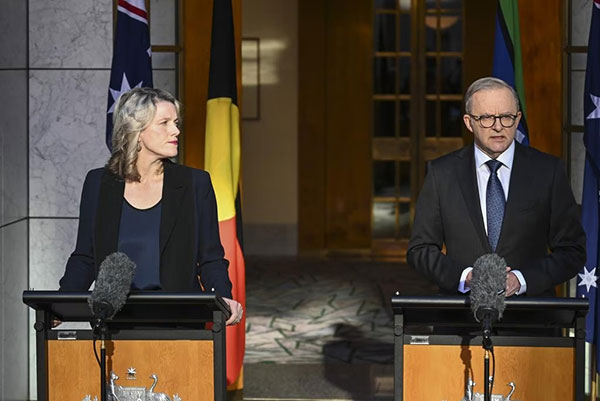The Australian Parliament on June 15 passed a law to prevent Russia from building a new embassy near Parliament House for national security reasons, as tensions between Canberra and Moscow increase over the Ukraine conflict.
Australian Prime Minister Albanese (right) announced the decision to cancel the land lease contract with Russia on June 15. Photo: Herald Sun
“The government has received very clear security advice about the risks posed by a new Russian presence so close to Parliament House. We are moving quickly to ensure the leased land does not become the site of a diplomatic mission,” Prime Minister Anthony Albanese told reporters on the decision to cancel the 99-year lease to Russia. Albanese said the opposition and other MPs not aligned with the government had been briefed on the legislation and it was passed unanimously in both houses of parliament less than two hours after it was introduced.
Australian Home Affairs Minister Clare O'Neil stressed that the land leased for Russia's second embassy is right next to Parliament House. The new law only prevents Russia from building an embassy near Parliament, not completely blocking Moscow's diplomatic presence in the Oceanian country. "Russia does have a diplomatic presence here and that will continue to be the case at its existing facilities in Griffith, just as Australia has a diplomatic presence in Moscow," Albanese said. He also awaited a response from Russian diplomats in Australia, who have threatened to take the matter to court.
Australia-Russia relations began to deteriorate last year. Australia is one of the most generous providers of military equipment, training and aid to Ukraine of any country outside the North Atlantic Treaty Organization (NATO) and has imposed sanctions on more than 1,000 Russian individuals and entities since the war in Ukraine began in February 2022. Australia has also banned the export of aluminium ore and alumina to Russia.
Australia's unease with Russia became clear late last year when officials in Canberra demanded Moscow be held accountable for Russian cybercriminals suspected of hacking into the country's largest health insurer, Medibank (which has nearly 10 million customers), and posting the medical information of its policyholders on the dark web.
HANH NGUYEN (According to AP, Reuters)
Source link





















































![[Maritime News] More than 80% of global container shipping capacity is in the hands of MSC and major shipping alliances](https://vphoto.vietnam.vn/thumb/402x226/vietnam/resource/IMAGE/2025/7/16/6b4d586c984b4cbf8c5680352b9eaeb0)













































Comment (0)